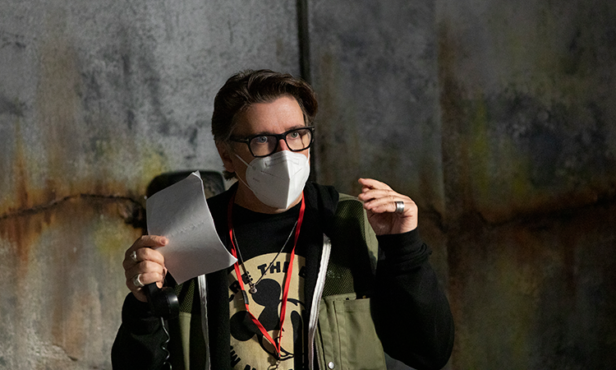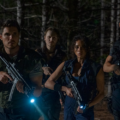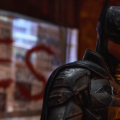Sinister and The Exorcism of Emily Rose director Scott Derrickson returns to his horror roots following Marvel’s Doctor Strange with a brutal film about childhood violence and trauma with The Black Phone.
It’s partly based on a Joe Hill short story from 20th Century Ghosts (a story that Derrickson has adored since its release) and the filmmaker’s own experiences growing up in North Denver, Colorado in the late 1970s.
Ethan Hawke stars as a menacing serial killer who abducts teenage boys, alongside a great ensemble cast of child actors including Mason Thames in his first major film role and Madeleine McGraw from Ant-Man and the Wasp.
We spoke to Scott Derrickson about how his tough upbringing influenced The Black Phone…
The violence in The Black Phone is brutal, especially when it comes to the depiction of bullying and school fights. At one point Gwen and Finney talk about Happy Days which people have a fond nostalgia for, so was the way you depicted violence a way to cut through that nostalgia and allow the reality of that era to seep in?
I just didn’t want to have a nostalgic approach to the past at all. It’s so standard for genre movies that have children in and that wasn’t what childhood felt like to me. The predominant emotion that I felt as a kid was fear. The bullying… I lived on a block with 13 boys, I was the youngest and our neighbourhood was violent. People fought almost every day. People bled a lot. There was violence in my home. The whipping scene is straight from my own memories. That’s not just me, most of the kids on my block had fathers who really worked them over with a belt… that was the time.
I was nine-years-old when my friend from next door, knocked on my door at night and he was weeping saying that someone had killed his mum. His mother had been abducted, raped, tied up in cord and thrown in the local lake. The presence of a killer and that fear that they would just show up and take you and kill you was very real to me.
The depiction of violence in many films speak to the trauma of it, like in Lynne Ramsay’s You Were Never Really Here. But you’re dealing in capturing it while it’s happening…
That was my favourite film that year. I think that’s a highly underrated film. My love of that film is extreme, I’ve seen it at least four times. I don’t make a movie to make a point or send a message, you have to let that evolve organically as you write the characters. The movie is about childhood trauma and specifically the resilience of children.
Not everybody had a childhood like mine, some people had good upbringings and never got bullied but childhood is traumatic for everybody. I feel like that subject is worth exploration rather than simply being nostalgic about the good side of what it’s like to be a kid.
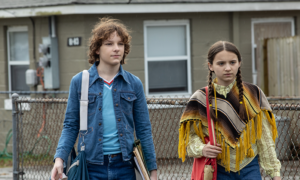
The film is based on a short story by Joe Hill, so can you talk me through the adaptation process with your co-writer C. Robert Cargill and how you developed the screenplay?
There was one ghost kid of [the Grabber’s] previous victims and we added four. All the victims were based on kids I knew when I was that age. The inclusion of the home life was really important to me. Basically, I read that story 17 years ago, when it was published. I thought it was amazing and a great idea for a movie. I had Cargill read it and he agreed, but we never knew how to expand it to a feature, until I brought in the idea of ‘what if I took all this stuff from my childhood, we set it in North Denver and expanded it like that’. He got it immediately, because he knew so much about that part of my life. I had been in therapy for three years, mostly dealing with my childhood traumas. So, we combined it with the book. Then we wrote it in six weeks.
I noticed William Castle’s The Tingler playing at one point in the film. What films or characters scared you most from your childhood?
I was about six or seven when I stumbled across that movie, watching TV by myself, and when the blood red scene came up, I was so shocked and horrified but also fascinated.
What I remember being more scared of than any films I saw, until Jaws when I was eleven… but I got really scared from the trailers I saw as a little kid. I remember the trailers from The Exorcist and even worse the trailer for The Omen because it had a little kid my age in it. It was terrifying.
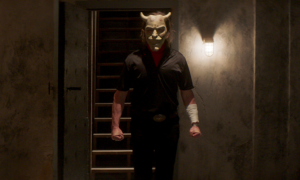
What scares you most now?
Once you’re a parent the thing that scares you most is the fear that something bad, especially something violent will happen to your own children.
You have kids, and you’re so excited, but what you don’t realise is that… a writer [Ruth Beck] I read who put it perfectly, said: “Having children is having your heart leave your body and then walk around unprotected for the rest of your life.” That’s my greatest fear.
The Black Phone will be in cinemas on 24 June 2022.
